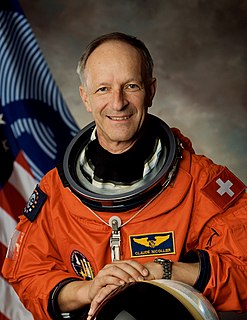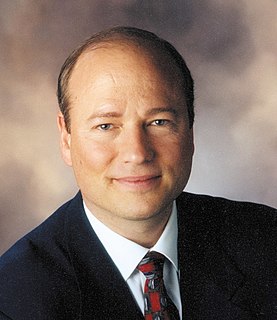A Quote by Robert Jastrow
The Hubble Law is one of the great discoveries in science; it is one of the main supports of the scientific story of Genesis.
Quote Topics
Related Quotes
When I first went to Hubble, as an astronomer and as a scientist, it was a dream come true. And as an astronaut, the Hubble missions are premiere missions because Hubble is so important to science, so important to humanity, that it's just a very special event. But as an astronomer, it was sort of the holy grail of missions.
Take the story of Cain and Abel. Why were we given that story? Scientifically, you may have an explanation for it, but I'm not approaching it from the scientific point of view. I'm saying: Why do we need that? It's a sordid story, a depressing story, a dark story. Why should I believe that I'm a descendant of either Cain or Abel? Thank God there is a third son! [Genesis 4:25]
The Christian church has a long history of gradually absorbing scientific perspectives and new discoveries. It seems to me that, in fact, that has been one of the strengths of Christianity - it has ultimately had great flexibility in absorbing new information about the world that we get from science.
Even mistaken hypotheses and theories are of use in leading to discoveries. This remark is true in all the sciences. The alchemists founded chemistry by pursuing chimerical problems and theories which are false. In physical science, which is more advanced than biology, we might still cite men of science who make great discoveries by relying on false theories.
The routine of custom tends to deaden even scientific inquiry; it stands in the way of discovery and of the active scientific worker. For discovery and inquiry are synonymous as an occupation. Science is a pursuit, not a coming into possession of the immutable; new theories as points of view are more prized than discoveries that quantitatively increase the store on hand.
The story of scientific discovery has its own epic unity-a unity of purpose and endeavour-the single torch passing from hand to hand through the centuries; and the great moments of science when, after long labour, the pioneers saw their accumulated facts falling into a significant order-sometimes in the form of a law that revolutionised the whole world of thought-have an intense human interest, and belong essentially to the creative imagination of poetry.
Science fiction - and the correct shortcut is 'sf' - uses actual scientific facts or theories for the source ideas or framework of the story. It has some scientific content, however speculative. If it breaks a law of physics, it knows it's doing so and follows up the consequences. If it invents a society of aliens, it does so with some respect for and knowledge of the social sciences and what you might call social probabilities. And some of it is literarily self-aware enough to treat its metaphors as metaphors.
The scarcest resource these days is reason. What's certainly striking about American culture today is the great hostility toward science and the decline of respect for rational scientific thinking. People seem to think that we are ruled by the scientific method and that we overvalue reason. If there was ever a period when we overvalued reason, I think that it was probably extremely brief. What I see now is a great deal of superstition, as much superstition as there has ever been. There are probably more people who believe in guardian angels than who understand the law of gravity.


































